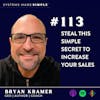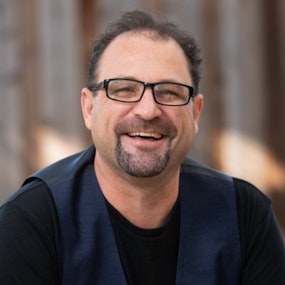Steal this Simple Secret to Increase Your Sales with Bryan Kramer

If you’re ready to learn how to grow a business with authentic, human-to-human sales, today’s episode is a must listen! Renowned business expert Bryan Kramer shares business growth strategies that are relatable, repeatable, and will allow you to grow a business in a scalable way now.
When was the last time you saw someone sharing supposed “sales secrets” that could teach you how to grow a business overnight?
Those kinds of business growth strategies are SO slimy and send potential clients running in the other direction!
Thankfully, today’s guest, sales expert Bryan Kramer, is here to teach us how to create a human-to-human sales approach that is relatable and repeatable so you can grow a business in a way that’s authentic AND scalable.
BY THE TIME YOU FINISH LISTENING, YOU’LL LEARN:
- How to grow a business with a “human-to-human” sales approach that’s relatable, repeatable, and scalable
- Business growth strategies that help you sell sincerely — even when selling through a screen
- What “Level 3” listening is and how you can use it to grow a business
_____________
Liked this episode? Pay it forward and share it with a friend.
Love the show? Write a 5-star review — even one sentence helps us keep bringing you the content you want to hear.
More from Courtney:
- Website: theeffortlesslife.co
- Instagram: @thecourtneyelmer
Some product links on this site are affiliate links, which means we'll earn a small commission for any affiliate purchases you make (at no additional cost to you). We only recommend products that we use and/or personally trust, so you can browse with confidence.
All Rights Reserved | © The EffortLESS Life®
Courtney Elmer 0:00
Welcome back. It's the AntiFragile Entrepreneurship™ Podcast, and this is episode 113.
[INTRO]
My guest today is a renowned business strategist, a global keynote speaker, and executive trainer and coach, two-time best-selling author and Forbes contributor, and he's here today to help you sell more and to do it authentically. His name is Bryan Kramer, and he's going to show you how you can create a human to human sales approach to grow a business that's relatable and repeatable. So that you can create a high touch human experience when selling, that's also scalable.
Courtney Elmer 4:15
I'm very excited because you're about to meet Bryan and he is going to shed light on how to grow a business, create real connection and build that trust and serve your audience sincerely. The real beauty that I find in what Bryan teaches is that it's so simple. It's something literally anyone can do when you make an intentional effort to do it and grow a business.
Bryan, welcome to the AntiFragile Entrepreneurship™ Podcast.
Bryan Kramer 5:30
Thank you so much for having me Courtney Elmer
Courtney Elmer 5:32
Something I'm very excited to dig into today is this idea of maintaining the human experience to grow a business. And so to get us started, I'd love to hear more about these three root cause problems that hold most business owners back that you talk about. What are those three things?
Bryan Kramer 6:17
Courtney Elmer, the three root cause problems are changing all the time. Right now, after the pandemic, things have changed, because now we're struggling with connection. More than any time. So connection is hard in this digital age of human to computer to human, and we're not having that, we can't create that as much as we want it to, in the traditional sense of what we're used to doing. So that's one of the challenges to grow a business is that I think is going to be our new normal. Now we're getting back to what things are gonna be like, but they'll never be the same again. And so we we have learned a new skill, we built a new muscle, and we're still learning it, it's going to take a while to figure out this hybrid of what, what this means and how we can create from being with someone without physically being with someone, how do you create deeper relationships without actually being with them in person to grow a business?
The best way to grow a business Courtney Elmer is to create deeper listening. I would say that the second thing that has changed is creating a way for that listening to become as I describe it, a level three. And the level three is where you're paying more attention to what people are saying.
If we actually spent more time with people, and lean into our level three would look a little bit different. What I want to define for you is like level one is listening. But you're not listening. My dad actually used to do this. He would actually jump in and listen to listen, and he could regurgitate what I was saying. He was busy. He was going to work to grow a business.
Number two is you're listening, but you're thinking about the next question. And so you're really not totally engaged, because you're still thinking about what you're going to say Courtney Elmer. And level three is you're totally embracing and listening deeply into what the other person is saying. And knowing that when the time is right, you're going to know exactly what you need to say. Whether you're in a call from whatever it is that calls to you. And you're come up with what's needed in the moment. And that's what you're going to say. So that level three is going to create more of that deeper connection Courtney Elmer.
And then the third thing that I think is has changed Courtney Elmer, is going slow to go fast. We are all burning out. Everybody's burning out. I haven't talked to anybody yet that isn't. Part of that means going slow, going slower, and I dare people to really sit down and take a step back and create little 5,10 Second micro moments where they can actually be more conscientious of themselves and really understand what's going on around them and then take one thing at a time and really understand what's going going on in their clients lives and what they want to be intentional about to grow a business. So that would be the third thing is going slowly, going fast.
Courtney Elmer 10:03
The first thing you said that we're struggling with connection and you put it so well, this idea of computer to human and human to computer.
I've been running and learning to grow a business for many years now. And that was something that I always noticed. But I think the reason that I noticed it was because my number one core value is connection. And it was the number one thing that was lacking in learning to grow a business. Bryan, what is your recommendation for us to be able to really create that human experience and to truly connect with someone?
Bryan Kramer 11:40
let me put you in this way Courtney Elmer, you and I are having an experience right now. And we can't see each other. And it's pretty powerful that we're creating. No matter what we come up with is going to deep be and we never really met before. We're having a higher level of conversation, than most people would actually take two have or have normally within a conversation to grow a business
So look at the questions that people are asking you in the kind of responses that people get, versus like what we are doing here. We ask questions that are like, how are you doing, which we don't really mean? Or we don't really, at the end of the day, your face goes blank, and you're like, I don't have time for this, I have to move to the next thing or, okay, how much money in revenue do you need to make on this in order to create this marketing thing to do better and grow a business? What does impact look like to you? If I can make an impact on the world, what would that look like? Now you're starting to think about the possibilities and you're thinking about how can I create this and and then you start digging in.
Where do you think you're going to start seeing things that will hold you back? And what's gonna start creating ways that you can even master this and create from other areas, and now you're getting them so far out of their head, they're seeing all the possibilities, and they're wanting to create, and you're, you're like putting this down, and you're seeing where this can actually happen together. And that's where I see the discussion, the communication being the key to all this digitally. You can ask powerful questions over anything over any device, which is why audio is killing it right now on social media. People love being on audio and talking to each other because they can ask each other powerful questions and have insanely awesome conversations. To answer your question Courtney Elmer, if you want to change things in the dynamics of the digital era that we're facing out of the out of all this, is get deeper by asking more powerful questions and that will grow a business.
Courtney Elmer 14:33
That perspective is extremely perceptive. This is the thing that got me excited about coaching to begin with and I know the coaches listening can probably agree with this is that it's it's taking this higher level view and you describe it and point to a moment ago is this level three listening. Level one, hey, how you doing? , fine, how are you? Surface level stuff. Level two is about growing a business. How are we doing on our goal? And did that get done? Really pulling back even more, and slowing down enough to ask ourselves these greater questions. Would you agree with that?
Bryan Kramer 15:53
Oh, I love what you did there Courtney Elmer. That was an awesome moment. Yes, totally. I was actually mirroring what you were saying. So it was totally in tune with what you were saying, which gets somebody present, right, you want to be in level three, mirror what the person is saying. And you're totally tuned in, and you were actually going slow, and creating, like a really awesome moment. And that's how you get deeper with people and, and really creating more connection with others and grow a business.
Where it goes off the rails is when you say, Now, can I tell you about what I'm selling usually goes into sales versus serving, you want to keep keep serving the other person to the point to where they understand where you can help them create. Usually that that gets to a point where it either makes sense or doesn't, they will ask you for your offer. And that's, that's more human. That's a human discussion versus a typical sales approach. Spend more time with people, get deeper in with powerful questions, serve them. And that's what you demonstrated in such an amazing way- create a relationship first so that they can get to know you, because we all want to do business with people we know like and trust.
And then from that point, they'll ask you, how do you work? What do you do? It shouldn't take you five minutes to tell you tell them how you work, which I come across all the time. And I'm like, no. Please stop. Tell them what you do. And how you do it in 30 seconds, what is your impact on the world? And how and how do you work with them in the short timeframe, because if you can't do that, you lost them. So this is about them, not you. This will help you grow a business.
Courtney Elmer 17:55
100% It's so easy to forget that. And I think sometimes to grow a business, we're focused on a goal, we can easily forget to serve, and the focus becomes on making this sale to grow a business. And something that you bring up a lot is this idea of human to human sales.
I think you alluded to this a bit and I'd like to go deeper with you here is how can we create that experience through slowing down? I imagine for someone listening right now they might go Yeah, Bryan, I'm, I'm with you, I've I really want to create this connection. I desire that. I want to serve while I grow a business. But there's only so much time in a day. And at the end of the day, I got to make sure that I grow a business has the revenue it needs to keep going to keep growing. So what would you say that we should focus on, to be able to achieve this level of depth and connection with the people that we desire to serve and grow a business?
Bryan Kramer 19:23
The idea of being human isn't about sales, it's also in our marketing and in our operations and in HR, and in our way of being an entrepreneur. We're putting all our eggs in one basket. As a business owner. You have to put everything into a diversified portfolio. That's how you grow a business. The most important thing is that you go at your business with creating processes, structure and systems that are going to support you so that you can even, I mean, dare I say, go on vacation and not have to check your email, and actually be human so that you're healthy.
The process and the systems and the structure, when you get down to it, those are the most important things to grow a business.. Those are the things in operations, in sales, in HR, in all of the things that support and grow a business that are going to create human touch points. So that you can do this because you can't do it alone. You want to build community and create something that's going to live past you if you do this alone. And that's the type of business you want, then go for it. People do that. But if you want to grow a business that has substantial growth, while supporting a healthy lifestyle, then that's a different approach Courtney Elmer.
And that's what I relate it to. Walking into a house. Most business owners will walk into the house and they'll create a frame, right Courtney Elmer? They'll create the frame of the house, and then they'll move the furniture right in without finishing the frame. And then from that point forward, they're selling stuff that they're really good at. And they'd never finished the house, all their structure, their systems and the processes and their onboarding, and their hiring and their or their marketing and their marketing systems or their sales systems or their operational systems, all those things aren't finished yet. And so they're trying to grow a business operating as a one man show, even if they have other employees, they're still operating like with constraints. And it's holding them back.
At this point, it's a really good idea to take a step back, slow down, to speed up and look at the house and say, How can we finish the frame, and the exterior of the house and even the paint and get it looking nice looking nice. So it matches, not only the inside, but maybe it points out the things on the inside that we need to work on. So we can get the two congruent. And grow a business that supports us. That's what I would do Courtney Elmer.
Courtney Elmer 22:24
That makes a lot of sense. I love that analogy. Because you wouldn't go to build a house without first laying out a plan for it. And then building that framework that's going to Foundation, the framework that's going to support everything that you're putting within that structure, both on the outside and on the inside. And I don't know why we would think to grow a business any differently. You've got to have that solid foundation. I think this is a sticking point for a lot of entrepreneurs.
Of course, I can't speak for everyone. But of the people I've talked to this certainly seems to be a common thing where innovate, they get to a point in their business where they're at capacity, they can't do any more, they don't have any more time to grow a business on their calendar, they're maxed out. So they think I need to hire people. So they go out, they kind of throw a job description together, they take the first person that applies, it says, Okay, you look great, let's get you in here and get your work in. But there's no clear plan for that person to really step in and start taking over the tasks that they need to be responsible for in order to help the business owner out.
And I talk about this a lot whenever I'm teaching our mastermind students, particularly when it comes to hiring is that if you don't have a clear system in place to grow a business, for doing X, Y or Z, it's going to be very difficult for you to ever teach someone else how to do X, Y, or Z. The system is like the glue that holds things together. It's the thing that allows you that enables or empowers you to be able to achieve whatever it is you're setting out to achieve. Whether that is to be consistent in your marketing, or to bring in more sales and revenue. It's really the backbone of your business.
It's the structure of the house. And so when you build a house, you think about how long it takes to build a house. And I don't know with all the delays, in today's post pandemic world of how long it takes to get lumber and whatever shipping from overseas and all this stuff. But you think our house doesn't go up overnight. It's that old adage Rome wasn't built in a day. And we can often get ahead of ourselves in business and again, I'm so guilty of this but thinking of oh my gosh, here's all the things I have to do the urgency we place on ourselves to get it all done now.
This resistance that we can encounter, to the idea of slowing down. What do you think that resistance comes from? Why do you think it is that we experienced that because I could sit here and go, yeah, go slow to go fast. That makes so much sense to really lay the foundation get a structure in place to grow a business, and at the same time, can also experience resistance in this idea of going slower than maybe in my mind, I think something should take. Does that make sense?
Bryan Kramer 25:38
Very well said Courtney Elmer. I believe that is an A No, no, it to be true. Because this was me. I burned out trying to grow a business and I burned out gloriously. I was speaking on the road, 200 days a year, or I was traveling that much. And then I was running a an agency, we were doing very well, at the time, were 30 people and a $30 million agency working with Netflix and MasterCard, and Cisco and all kinds of stuff. And at the time, it was like, from the outside looking in, it was amazing. But from the inside, I was burning. I was like, wow, what is happening?
Then one day, my 11 year old grabbed me by the hand, and he pulled me into his bedroom. He said, Dad, you're so fat. He said, You're so fat. And I was like, You're right, I ate my way through every country because the food was so good. And he said, you have diabetes. And he's right, I got it. And he said, and you're never here, you never learned our school functions, and you're gonna die sooner because and you'll never see your grandchildren or meet them. And I'm like, Oh, my God, this kid and and he's, he like, totally nailed me.
I've kind of make a U turn in my life Courtney Elmer. This is horrible. Low, the lifestyle and the healthiness I'm living in. And I came back from another trip. And I said to Courtney, my wife, we have to change everything, not us. But everything else. And we built had to build in with it, redo everything, structure systems process, like we put ourselves through all of that. And because we're making money doesn't mean we were happy and healthy. And money is not the cure for any of this.
And so we did, I never traveled again, like that ever Courtney Elmer. That was before the pandemic happened. And then at that point, I lost 85 pounds, I'm now standing here, diabetes free. And I'm living a way different life. I'm living my most joyful life. And now I know the answer to that. And the answer is I had to know what impact I wanted on the world. And it was totally different than what I was doing at the time. Then everything changed for me. Focus on your impact to grow a business.
Courtney Elmer 29:12
I relate to what you shared in your own personal story so much. Had I not had an experience like that. I don't know if I would have changed anything. I think a lot of people haven't had the opportunity to hit rock bottom in a sense, to have a wake up moment like that.
If you continue to keep going and keep doing you will have that moment. It's coming for you, so why not change things? Now? And if you're listening and you haven't had that moment yet and you're working at a pace that you are feeling is too much for you. That moment is coming. And there's no rule that says, you have to wait for that moment to make a change.
Bryan, this might be a really perfect note to end on, I'd be curious to hear because what you said, the impact that you want to make is different than your why. And as we grow a business, we need to have our why and what that is, and what gets us out of bed every morning. How is that different than the impact that you want? For your business in the world? That's part one of this question. And then part two would be and how do we go about discovering what that is, so that we can get out there to create that?
Bryan Kramer 31:16
It's not about your business, it's about who you are as a person and what you believe in the world. And usually, it's the opposite of what really ticks you off. In my case being human is your competitive advantage. Now, most of the time people walk in the room, and they see exactly what you do. Now, if somebody comes up and says, Hey, what do you do, and you say, I believe being human is your competitive advantage. That's way more well impactful, and it starts to spark more human discussion around what we really care about.
Courtney Elmer 34:47
As you were sharing that the idea that came to me. If you have an impact, you can have a beautiful impact statement for yourself to grow a business or you can believe all of these things and see all of his change that you want to create. But without something to drive you to create that change, which is your why you're not going to get very far.
So to your point, you do need both. And having that impact statement can really help you take that to the next level and almost unlock this new level, maybe a new level that you've been trying to achieve to grow a business. And that level could look different for anyone, right? It could be a certain level of revenue or certain level of impact, right? However, you might be measuring that. But that you might have felt like you haven't been able to get there for some reason.
I think this is such a valuable thing to slow down to grow a business and figure out is what impact do you want to create? What do you believe in? What would you be willing to fight to the death for? Maybe not literally, but metaphorically? Or maybe literally, you never know, I mean, what are those things that that are non negotiable for you, that you believe that could potentially contribute to making this world a better place.
I love this level of depth that you bring to the conversation about learning to grow a business, and about how as business owners, we want to make an impact, we want our lives to mean something we want to help others and to live our dreams to, to be the humans that we've been created to be to reach and live to our potential. And there's that desire there. And so often, the actual day to day of running and learning to grow a business can get in our way of doing that. And so, you beautifully bring this back down to basics for us to really look on a deeper level, at our drivers and at the things that motivate us at the impact that we want to make in the world.
Bryan, thank you so much for being here today to talk about how to grow a business.
Bryan Kramer 39:06
Thank you so much Courtney Elmer.
Courtney Elmer 39:15
I'll see you back here next week. Until then, go live your EffortLESS Life®.

Bryan Kramer
CEO
Bryan Kramer is a renowned business strategist, global keynote speaker, executive trainer and coach, investor, two-time bestselling author, and Forbes contributor. As President and co-owner of PureMatter, a Silicon Valley global marketing agency since 2001 and CEO of H2H Companies, he sparked the Human-to-Human “H2H” global movement that sets out to humanize business through simpler communication, empathy, and celebrating our imperfections. His TED Talk featured a TED “first” – allowing mobile devices during the event to illustrate his belief that even a small inspirational share holds the power to change the world for the better. Bryan has spoken all over the world, over 200 times at global companies including Mastercard, L‘oreal Paris, NASA, GoDaddy, Harvard University, Charles Schwab, SXSW, International Culinary Institute, Verizon, Dell, NFL, and Hawaii Lodging & Tourism, to name a few.








